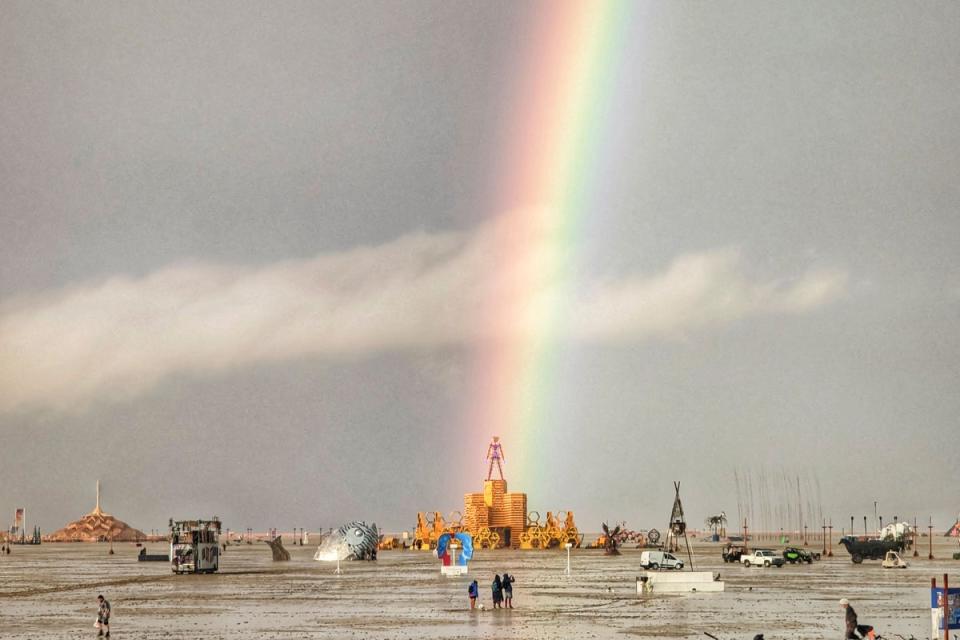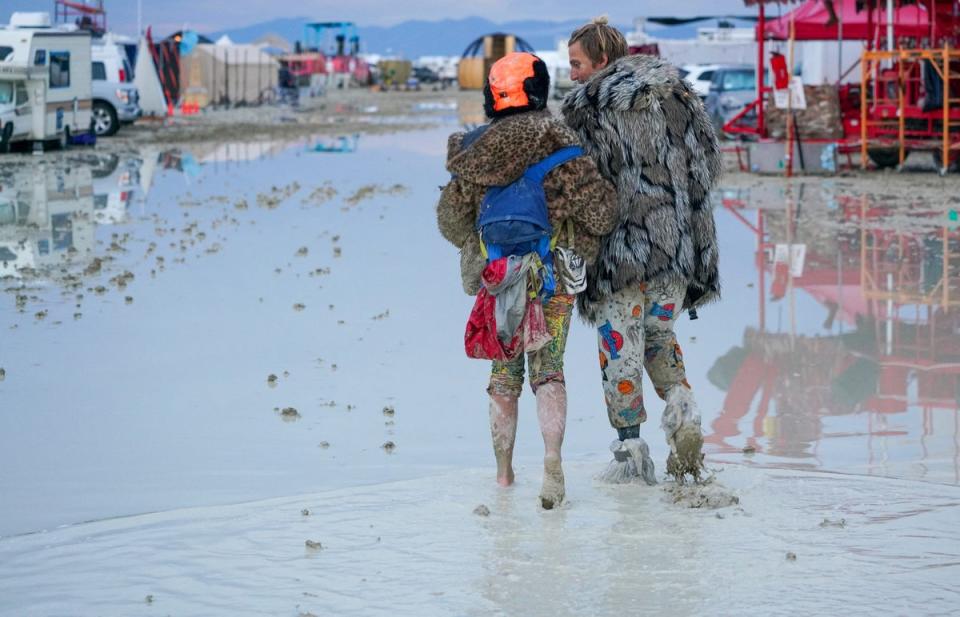Burning Man festivalgoers begin exodus after flooding left thousands stranded in Nevada desert

Thousands of partygoers stranded for days at the Burning Man festival have begun their exodus from the Nevada desert as conditions that left roads impassable finally eased.
Burning Man organisers said they began to let traffic flow out of the main road around 2pm local time on Monday - even as they continued to ask revellers to delay their exit to Tuesday to ease traffic.
As of Monday afternoon, they said about 64,000 people remained at the festival site.
Organisers also asked attendees not to walk out of the Black Rock Desert about 110 miles north of Reno as others had done throughout the weekend, including celebrity DJ Diplo and comedian Chris Rock. They did not specify why.
The festival had been closed to vehicles after more than a half an inch of rain fell on Friday, turning the site into a quagmire.
The road closures came just before “the Man” was to be set ablaze on Saturday night.
The event traditionally culminates in the torching of the large wooden effigy shaped like a man and a wooden temple structure during the final two nights, but the fires were postponed to Monday night as authorities worked to reopen exit routes.
While some festivalgoers were revelling in the mud, others told of their exasperation.
Faye, a Burning Man participant who lives in London, told the BBC she has been left “covered in mud for the past three days”.
“There are no showers here,” she said. “The only thing you can do is wash with baby wipes inside your tent.”
Muse frontman Matt Bellamy biked through miles of muddy desert as an estimated 70,000 were left trapped by the heavy rain.
Mark Deutschendorf, a meteorologist with the National Weather Service in Reno, said it should stay mostly clear and dry at the festival site on Monday, although some light rain showers could pass through Tuesday morning.
“We are a little bit dirty and muddy but spirits are high. The party still going,” said Scott London, a southern California photographer, adding that the travel limitations offered “a view of Burning Man that a lot of us don’t get to see”.

The annual gathering, which launched on a San Francisco beach in 1986, attracts nearly 80,000 artists, musicians and activists for a mix of wilderness camping and avant-garde performances.
Disruptions are part of the event’s recent history: Dust storms forced organisers to temporarily close entrances to the festival in 2018, and the event was twice cancelled during the pandemic.
At least one fatality has been reported, but organisers said the death of a man in his 40s was not weather-related. The sheriff of nearby Pershing County said he was investigating but has not identified the man or a cause of death.
President Joe Biden told reporters in Delaware on Sunday that he was aware of the situation at Burning Man, including the death, and the White House was in touch with local authorities.

The event is remote on the best of days and emphasises self-sufficiency. Amid the flooding, revellers were urged to conserve their food and water, and most remained hunkered down at the site.
Some attendees, however, managed to walk several miles to the nearest town or catch a ride there.
Diplo, whose real name is Thomas Wesley Pentz, posted a video to Instagram on Saturday evening showing him and Rock riding in the back of a fan’s truck. He said they had walked six miles through the mud before hitching a ride.
“I legit walked the side of the road for hours with my thumb out,” Diplo wrote.
Cindy Bishop and three of her friends managed to drive their rented RV out of the festival at dawn on Monday when, Bishop said, the main road was not being guarded.

She said they were happy to make it out after driving towards the exit - and getting stuck several times - over the course of two days.
But Bishop, who travelled from Boston for her second Burning Man, said spirits were still high at the festival when they had left. Most people she spoke with said they planned to stay for the ceremonial burns.
“The spirit in there,” she said, “was really like, ‘We’re going to take care of each other and make the best of it’.”
Rebecca Barger, a photographer from Philadelphia, arrived at her first Burning Man on August 26 and was determined to stick it out through the end.
“Everyone has just adapted, sharing RVs for sleeping, offering food and coffee,” Ms Barger said. “I danced in foot-deep clay for hours to incredible DJs.”
The event began on August 27 and had been scheduled to end on Monday with attendees packing up and cleaning up after themselves.

 Yahoo News
Yahoo News 
